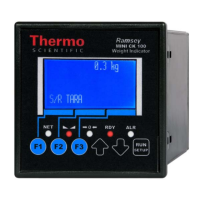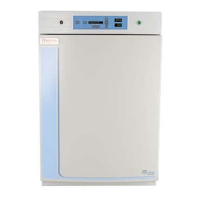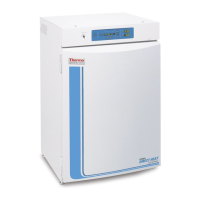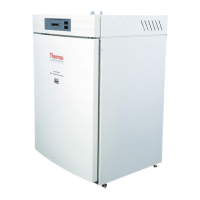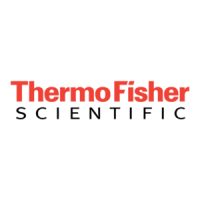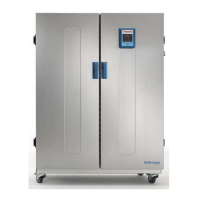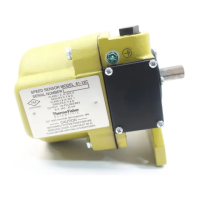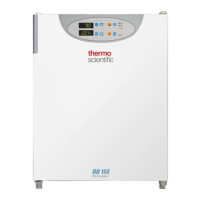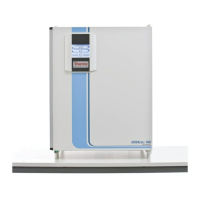Do you have a question about the Thermo Scientific Cytomat 2 and is the answer not in the manual?
Provides essential safety and operational guidelines for personnel performing adjustments on the Cytomat® 2 and its Plate Shuttle™ System (PSS).
Details the conditions and validity period for the manufacturer's warranty on the Cytomat® 2 automatic incubator.
Defines the meaning of graphical symbols used within the documentation, particularly for warnings and important notes.
Outlines the versions, applications, and interface specifications for the Plate Shuttle™ System (PSS) software and service software.
Details the technical interface parameters, including RS 232, handshake, baud rate, parity, stop bits, and data format.
Specifies how the software is delivered, typically on CD, and its availability for separate ordering.
Explains how actions and movements are initiated and monitored using queries and commands, categorizing them into status, complex, and simple movements.
Demonstrates practical examples of querying device status, including the overview register, and executing commands like unloading microplates.
Details how to check system status by querying specific registers, including the overview register and status check bytes.
Lists and explains the various error codes that indicate why a command was not executable.
Describes the warning register, its values, and how it is used to track current warnings or errors during operation.
Explains the error register, its values, and how it stores errors that could not be corrected by the built-in error correction function.
Details the action register, which logs current movement steps and provides information on movement targets and execution status.
Explains how to query the SWAP station register to check plate positions and load status.
Introduces the two types of commands (high-level and low-level) used to activate the Plate Shuttle™ System (PSS) and explains storage location numbering.
Describes automated, time-optimized movement processes initiated by high-level commands, detailing their execution flow and responses.
Explains low-level commands for individual motor movements, enabling custom process generation by the external system.
Describes the routine to check the load status of stackers by scanning each storage location for microplate presence.
Details using an optional barcode reader for enhanced location scanning, including reading and saving microplate ID numbers.
Explains commands for configuring the Plate Shuttle™ System (PSS), including stacker type and communication settings.
Covers commands for querying and changing nominal values for the device's heating system and CO2 supply.
Details the criteria used by the PSS controller to examine command legitimacy and the resulting error messages or confirmations.
Explains how the PSS monitors potential error sources during operation and outlines the internal error routines for handling detected errors.
Illustrates the structure of communication telegrams, including the use of STX, BCC, and ETX for data security and error checking.
Lists the minimum hardware and software requirements for the computer system used to interface with the Cytomat® 2.
Guides users through the service program interface, detailing main menus like Parameter, Testing, Init, and Adjustment for system configuration and diagnostics.
Details the motor-specific parameters that can be read, saved, and viewed for fine-tuning system movements.
Explains basic settings controlling PSS movements and stacker configuration, which can be read, saved, and viewed.
Describes the free running function for starting complex test procedures and tracking their progress via a dialog box.
Covers routines for initializing individual stepper motors and restarting motor controllers or the complete PSS.
Details the process for adjusting the handler at the transfer station, covering parameter checks, modifications, and movement initiation.
Explains configuration of different stacker types and settings, including pitch value, number of plates, and plate indexing.
Provides an overview of the most recent errors saved in the PSS, including type, description, and destination.
Allows enabling of protected program functions by entering a password, typically reserved for technical service.
Enables or disables the logging of transmitted telegrams to a file for later analysis.
Establishes a permanent connection to the barcode scanner for data acquisition and processing.
Establishes a permanent connection to the heating system control and CO2 supply (HERAcell) for data exchange.
Describes the connection of a barcode scanner via the RS 232 interface to the Plate Shuttle™ System (PSS).
Explains the necessary handler positioning for the barcode scanner to accurately read barcodes on microplates.
Lists preset barcode reading programs and mentions the possibility of changing factory settings using freeware.
Provides detailed technical specifications for the barcode scanner, including light source, scan rate, bar code types, and interface parameters.
| Temperature range | Ambient +5°C to 50°C |
|---|---|
| CO2 range | 0-20% |
| O2 control | Optional |
| Humidity control | Yes |
| Humidity Range | Up to 95% RH |
| Type | Automated Incubator |
